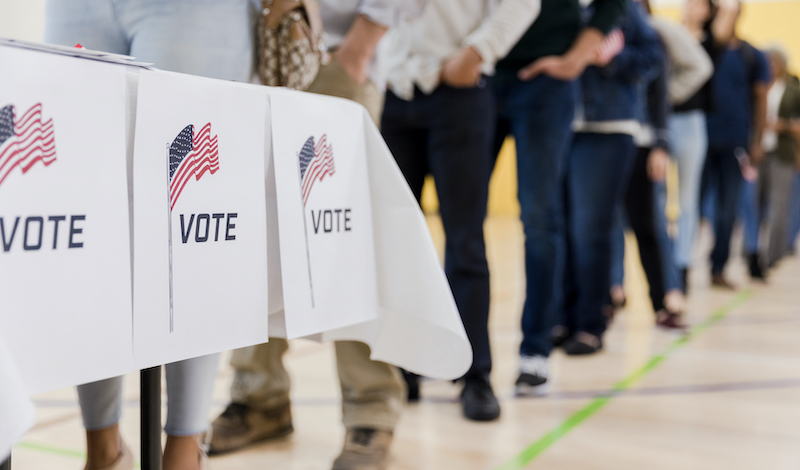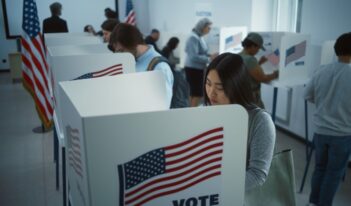
New York City’s move to allow noncitizens to vote in local elections is not unprecedented.
“No taxation without representation.” The slogan that once heralded America’s independence from British rule might be applied today to the issue of noncitizen voting rights.
Nearly 22 million people living in the United States are not citizens and cannot vote. Although noncitizens are generally prohibited from voting in most federal and state elections, some local jurisdictions are opening their voting booths to citizens and noncitizens alike.
Last December, the New York City Council approved legislation allowing certain noncitizens to vote in some local elections. The new law allows permanent residents who have lived in New York City for at least 30 days, including individuals who have green cards, workers permits, and DACA status, to vote in elections for mayor, public advocate, borough president, and city council.
In total, this law allows over 800,000 adult permanent residents in New York City to vote, making New York City the largest jurisdiction in the United States to authorize noncitizens to vote.
Only 14 other jurisdictions allow noncitizens to vote in certain local matters: 11 municipalities in Maryland, 2 in Vermont, and 1 in California.
But noncitizen access to voting was not always so limited in the United States.
In colonial America, citizenship did not bear on one’s eligibility to vote. Any white man that owned property could vote. By 1800, 12 of the original 13 states had at one point allowed noncitizens to vote.
Yet the availability of noncitizen voting eventually led to backlash.
In 1798, the Alien and Sedition Acts imposed stricter citizenship requirements and looser standards for deportation of noncitizens. The anti-immigrant sentiment of that time continued as the United States faced the War of 1812 and the Civil War. The fear of foreign threat escalated in wartime, as some U.S. citizens feared immigrants would oppose the institution of slavery.
The end of the Civil War ushered in a new era of pro-immigrant policies. Increased need for new labor, due to both the end of chattel slavery and westward expansion, encouraged migration to the United States. The percentage of U.S. states and territories permitting noncitizen voting reached an all-time high during this period of American history, at 21 percent.
In 1875, the U.S. Supreme Court affirmed states’ authority to allow foreign nationals with the intention of becoming citizens of the United States to vote. In Minor v. Happersett, the Court ruled that “citizenship has not in all cases been made a condition precedent to the enjoyment of the right of suffrage,” validating the voting laws in nine states that allowed noncitizens to vote.
Many of these laws, and others in force at the time, specifically required that a noncitizen make a declaration of intention to become a U.S. citizen to become eligible to vote.
In a 1993 law review article, U.S. Representative Jamie Raskin (D-Md.) argued that this declarant qualification quelled “nationalist opposition” to noncitizen voting by reframing it as a “pathway to citizenship rather than a possible substitute for it.”
The 20th century saw a rapid decline in noncitizen voting. The rise of white nationalist groups and wartime nationalism contributed to anti-immigrant rhetoric and a weakening of noncitizens’ rights and privileges. By 1928, for the first time in a hundred years, no states allowed noncitizens to vote.
Since then, noncitizens have been largely excluded from voting.
Yet immigrants, whether citizens or not, remain essential to the United States. In 2016, immigrants added 2 trillion dollars to the U.S. gross domestic product. In 2018, they paid $458.7 billion in state, local, and federal taxes.
New York City’s recent law allowing noncitizens to vote in local elections aims to “ensure that all New Yorkers—noncitizen New Yorkers who live here, who are raising children here, who shop in our stores, who own small businesses—have the opportunity to have a say, in our democracy,” according to a reported statement by Anu Joshi, vice president of policy at The New York Immigration Coalition.
Opponents of the New York City law and others like it argue that noncitizen voting could discourage people from seeking citizenship. Former New York City Mayor Bill De Blasio said that he had reservations about allowing noncitizens to vote in local elections, as he would like to see the city “encourage people to become citizens fully.”
The new law’s implications could be significant, as New York City’s size and influence could propel the discussion about noncitizen voting into the national spotlight. New York City’s move to allow noncitizen voting may even herald a new era about immigration and the rights and privileges of noncitizens in the United States.



